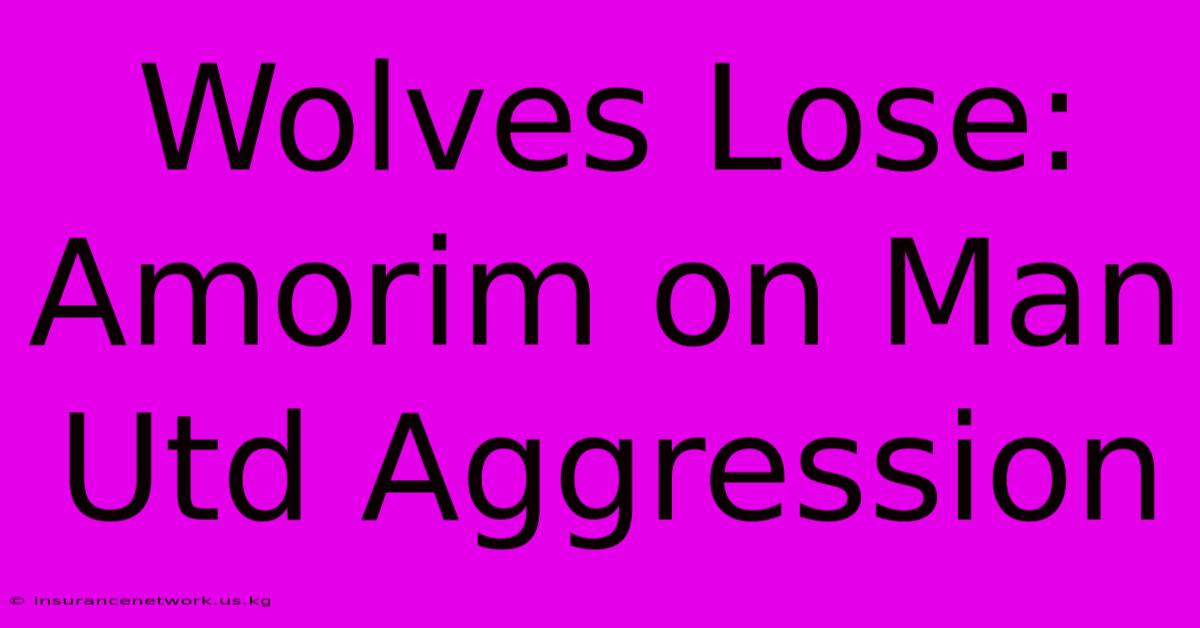Wolves Lose: Amorim On Man Utd Aggression

Discover more detailed and exciting information on our website. Click the link below to start your adventure: Visit Best Website insurancenetwork.us.kg. Don't miss out!
Table of Contents
Wolves Lose: Amorim on Man Utd's Aggression
Wolves' disappointing 1-0 defeat to Manchester United left manager Julen Lopetegui frustrated, but it was the post-match comments from Sporting CP boss Ruben Amorim that added another layer of intrigue to the narrative. Amorim, known for his tactical acumen, offered a unique perspective on the game, focusing on the intensity and aggression displayed by Erik ten Hag's side. His analysis provides valuable insight into the factors contributing to United's victory and Wolves' struggle.
Manchester United's Aggressive Approach: A Winning Formula?
Amorim didn't mince words when discussing Manchester United's performance. He highlighted their aggressive style of play, praising their ability to disrupt Wolves' rhythm and control the tempo of the match. This aggressive approach, he suggested, wasn't simply physical; it was a calculated strategy that permeated every aspect of their game, from pressing high up the pitch to winning crucial tackles and aerial duels.
High Pressing and Disrupting Play
The intensity of Manchester United's high press significantly impacted Wolves' ability to build from the back. Amorim likely observed how United's forwards relentlessly harried Wolves' defenders, forcing errors and limiting their passing options. This high-pressing strategy is a hallmark of Ten Hag's philosophy, and its effectiveness against Wolves was undeniable.
Winning the Aerial Battles
Manchester United's dominance in the air, particularly in midfield and defense, also played a crucial role. Amorim's observations likely included the effectiveness of United's aerial duels, winning second balls and regaining possession in dangerous areas. This physical dominance further restricted Wolves' attacking opportunities.
Wolves' Struggles: A Tactical Breakdown
While praising Manchester United's aggression, Amorim's analysis implicitly highlighted areas where Wolves fell short. The inability to cope with United's intensity suggests a potential tactical mismatch or a lack of execution in their own game plan.
Lack of Creativity in the Final Third
Wolves' struggles to create clear-cut chances point towards a need for improved attacking creativity. Amorim may have noticed a lack of incisive passing, movement off the ball, and overall fluidity in Wolves' attacking play. This creative deficiency was likely exacerbated by United's suffocating defensive pressure.
Difficulties Handling United's Physicality
Amorim’s comments likely alluded to Wolves’ difficulties in matching Manchester United's physicality. The game demonstrated a clear disparity in the intensity of the two teams, with United consistently winning individual battles and physical confrontations. Overcoming this physical disadvantage will be crucial for Wolves in future matches.
Lessons Learned and Future Prospects
The match against Manchester United provided valuable lessons for Wolves. Amorim's insightful comments offer a perspective on the tactical battles waged on the pitch. Understanding the effectiveness of United's aggression and identifying Wolves' shortcomings will be key to improving future performances.
Key takeaways for Wolves include:
- Improving the team's ability to withstand high-pressure tactics.
- Developing a more creative and fluid attacking approach.
- Enhancing the team's physicality and ability to compete in aerial duels.
By addressing these weaknesses, Wolves can hope to improve their results and better compete against top-tier Premier League teams. Amorim's assessment serves as a valuable external analysis for Lopetegui and his staff, offering a fresh perspective on areas requiring attention. The loss against Manchester United should serve as a catalyst for growth and improvement for Wolves.

Thank you for visiting our website wich cover about Wolves Lose: Amorim On Man Utd Aggression. We hope the information provided has been useful to you. Feel free to contact us if you have any questions or need further assistance. See you next time and dont miss to bookmark.
Featured Posts
-
Rutgers Football Score Kansas State Game
Dec 27, 2024
-
Chelsea Vs Fulham Player Performance
Dec 27, 2024
-
Aviation Chinas New Fighter Emerges
Dec 27, 2024
-
Chelsea Vs Fulham Player Ratings And Report
Dec 27, 2024
-
New China Fighter Jet Videos Released
Dec 27, 2024
